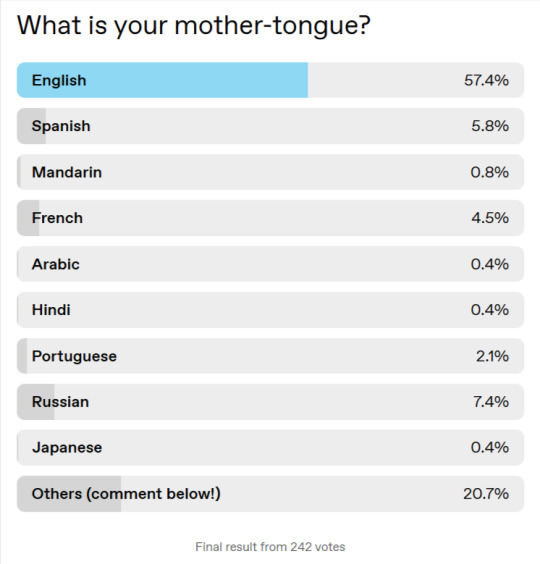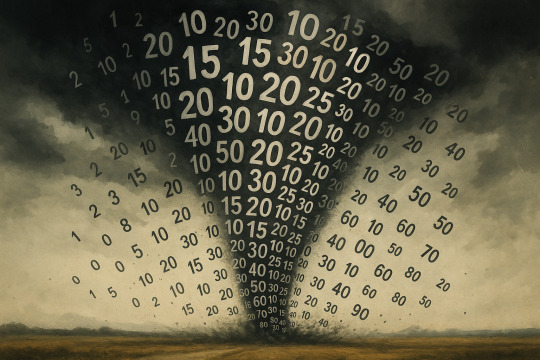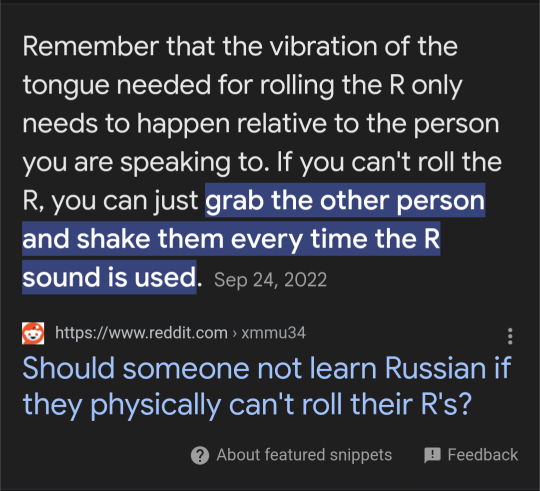This is an accompanying blog for HAXYR3 project (haxyr3.com) founded by Eugenia Vlasova, a Russian linguist and tutor. This is the right place to find interesting links, music and video related to the Russian culture and language. Feel free to ask me any questions.
Last active 3 hours ago
Don't wanna be here? Send us removal request.
Text

Wow, you all blew me away with your responses to the “What’s your mother-tongue?” poll! 🌍 With 242 votes, here’s the breakdown:
English: 57.4%
Spanish: 5.8%
French: 4.5%
Portuguese: 2.1%
Russian: 7.4%
Others: 20.7% (thanks for sharing in the comments—I absolutely love the favorite words you dropped!)
The variety is incredible, and it’s so cool to see Russian at 7.4%! 😄 It’s a great sign that native Russian speakers are curious about their own language and eager to learn new angles—love that energy!
This got me thinking: how do your native languages shape the way you tackle Russian? Share your thoughts below or tag a friend who’d enjoy this convo!
Next up, I’m curious—what’s the easiest part of Russian for you so far? Drop your pick in the replies, and I’ll tally the votes for a future post. Stay tuned for more language adventures!
2 notes
·
View notes
Text
What's your mother-tongue?
Hey, awesome folks! Random Q: what’s your mother tongue? The language you first spoke or your family’s go-to. I’m obsessed with this stuff, so vote in the poll, reply, tag, or DM me! (Languages listed randomly as they came to mind. Don’t see yours? Comment below!)
Bonus: What’s a word you love in your mother tongue? Share in the comments!
38 notes
·
View notes
Note
Hi Eugenia, what is the difference in usage between самый, очень, and весьма when trying to say very?
Hi! Here's a concise explanation of their usage and differences:
Самый: This word primarily means "the most" rather than "the very" and is used for superlative or emphatic purposes. It agrees in gender, number, and case with the noun it modifies (e.g., самый лучший, самая красивая). For example: Это самый интересный фильм ("This is the very most interesting film"). When 'very' means 'exact same' or 'precise,' you can use самый in Russian to emphasize identity: Это тот самый дом, в котором жил Толстой. (This is the very house where Tolstoy lived.)
Очень: This is the most common and versatile word for "very" in Russian. It’s an adverb that intensifies adjectives, adverbs, or sometimes verbs, and it’s used in both spoken and written language across all registers. For example: Она очень умная ("She is very smart") or Я очень устал ("I am very tired"). It’s neutral and widely applicable, making it the go-to choice in most situations.
Весьма: This adverb also means "very" but is more formal, bookish, or slightly old-fashioned. It’s typically used in written or elevated speech and can sound refined or polite. It modifies adjectives or adverbs, similar to очень, but carries a nuanced tone, often implying "considerably" or "quite." For example: Это весьма любопытно ("This is very/considerably curious"). It’s less common in casual conversation and might feel out of place in everyday spoken Russian.
Key Differences:
Tone and Register: Очень is neutral and universal; весьма is formal and less common in speech; самый is emphatic and often tied to superlatives or specific contexts.
Grammatical Role: Самый is an adjective modifying nouns and requires agreement, while очень and весьма are adverbs modifying adjectives, adverbs, or verbs.
Frequency: Очень is by far the most frequently used in modern Russian, весьма is rarer and more formal, and самый is common but context-specific (more for "the most" or emphatic "very").
Examples for Clarity:
Очень красивый дом ("A very beautiful house") – Neutral, common.
Весьма интересная книга ("A very interesting book") – Formal, sophisticated.
Самый лучший день ("The very best day") – Emphatic, superlative.
If you’re aiming to say "very" in everyday conversation, очень is your safest and most natural choice. Use весьма for formal or written contexts, and reserve самый for cases where you’re emphasizing "the most" or a specific noun’s quality.
27 notes
·
View notes
Text
My three most recent Russian Numbers Cheatsheets are now available as a money-saving bundle!
If you've been following my Russian learning content, you know numbers are where even advanced learners trip up. Those declensions? The noun agreements? Don't even get me started on dates! 😅
I've bundled all three of my numeral cheatsheets:
Number Declensions (все эти один, двух, шестью ...)
Number-Noun Agreement (why is it две утки but пять уток??)
Russian Dates (because saying "April 12th" shouldn't be rocket science)
Bundle price: $11.99 (was $14.97 - that's 20% off!)
Perfect for:
Cramming before exams 📝
Quick reference during conversations
Finally understanding why Russian numbers are "Like That"
P.S. My Patreon members get these FREE - just saying 👀
11 notes
·
View notes
Note
What is the difference between самый and наиблее? Also, is it true that you can also form a superlative adjective by using the word least, adding -ейш / -айш to the stem (making it informal), or by using всех / всего?
Hi! Great question! Both самый and наиболее express the superlative degree, meaning "the most," but they differ in grammar, usage, and style.
Самый is an adjective and must agree in gender, number, and case with the noun it modifies. For example:
Это самый большой чайник в нашем офисе. (masculine)
Это самое старое кресло в моём доме. (neuter)
Это самая глупая идея! (feminine)
Это самые умные дети в нашей школе. (plural)
Наиболее, on the other hand, is an adverb and does not change form. It typically modifies an adjective and is used in more formal or written contexts:
Это наиболее крупный слон в зоопарке. (masculine)
Это наиболее удобное кресло в нашем офисе. (neuter)
Это наиболее разумная идея! (feminine)
Это наиболее талантливые дети в школе. (plural)
While самый is versatile and common in both spoken and written Russian, наиболее is more formal and less frequent in casual conversation. It’s often found in academic, technical, or official contexts.
Regarding your second question, yes, you can form superlative adjectives by adding the suffixes -ейший or -айший to the adjective stem (e.g., старый → старейший, глупый → глупейший, удобный → удобнейший). Contrary to being informal, these forms are typically formal or literary and are less common in everyday speech. They often carry a slightly emphatic or elevated tone.
Using всех or всего alone does not form a superlative adjective. Instead, these words are used with a comparative adjective to express a superlative meaning, often in a colloquial or emphatic sense. For example:
Он умнее всех. (He is the smartest of all.)
Они старше всех. (They are the oldest of all.)
Эта идея глубже всего, что я слышала. (This idea is the deepest of all I’ve heard.)
In these cases, всех (genitive plural, "of all") or всего (genitive singular, "of everything") emphasizes the comparison across a group or entirety. This construction is common in spoken Russian and less formal than самый or наиболее.
Hope this clarifies things! Let me know if you have more questions.
18 notes
·
View notes
Note
I just saw your post about dates in Russian and it reminded me that I always struggle with the words "date" and "appointment" for different contexts (it's the same word in Spanish) like "doctor's appointment", "romantic date", etc. I recently learnt also that if you go to the psychologist, it may not be the same word as going to the doctor because, well, the doctor may be once a year and psychologist may be weekly.
Do you have a post where you explain the differences in Russian?
Thanks!
Hi! In Russian, we use different terms depending on the context, unlike Spanish where "cita" covers both. Here’s a guide to help you navigate these situations:
свидание (svidanie): This means a romantic date. It is also used for visits to prisoners by family or friends.
Example: У Ольги свидание с Колей. (Olga has a date with Kolya.)
Bonus: For ongoing romantic relationships, you’d say встречаться (to date): Они встречаются полгода. (They’ve been dating for six months.)
приём (priyom) or запись (zapis): These are used for professional appointments, like seeing a doctor, psychologist, or lawyer. Both work for one-off or regular visits, including therapy.
Example: Когда ты идёшь на приём к психологу? (When are you seeing the therapist?)
To book such an appointment: записаться на приём (to make an appointment). E.g., Она записалась на приём к врачу. (She booked a doctor’s appointment.)
встреча (vstrecha): This means a meeting, often for business or planned gatherings, but it can also describe casual meetups with friends.
Example: У нас завтра встреча в пять. (We have a meeting at five tomorrow.)
For scheduling: назначить встречу (to arrange a meeting). E.g., Президент назначил встречу с министром. (The president scheduled a meeting with the minister.)
Regular therapy visits: For frequent psychologist appointments, Russians often say ходить к психологу (to go to the psychologist), emphasizing the routine.
Example: Он ходит к психологу каждую неделю. (He goes to the psychologist weekly.)
These distinctions make Russian precise in separating romantic "dates" from professional "appointments." If you’re curious about other scenarios, let me know, and I’ll share more examples!
32 notes
·
View notes
Text
When my grandfather was graduating school, he wrote “В лето Господне... ” in an essay—an old, pre-revolution way to say “A.D.” A week later, he was arrested for “organizing an anti-government movement among classmates.” Those words were the only “proof” of his guilt. He was lucky—released after six months when they couldn’t prove anything. Dates in Russian carry such weight, don’t they? That’s why I wrote a new blog post, How to Say Dates in Russian, breaking down centuries, years, full dates like “девятнадцатого февраля двухтысячного года” and special words for B.C./ A.D. As a Russian teacher (and immigrant who still counts in Russian in my mind), I share tips to make it easy.
Want to master it? Grab my How to Say Dates in Russian Cheatsheet for $4.99 in my shop!
Read the post and share a date you’ve practiced in the comments!
32 notes
·
View notes
Text
youtube
Stanislav Chernyshov invites everyone to his online speaking club
I can vouch for his engaging and approachable nature. He knows how to make conversations both enjoyable and productive. This club is the perfect chance to boost your Russian speaking skills in a relaxed, stress-free environment. DISCLAIMER: I am not affiliated with Stanislav Chernyshov and his language school. I just really love his approach to teaching Russian.
12 notes
·
View notes
Text
New post alert! 🐾 Learn to count in Russian with my latest blog, "How to Count in Russian Without Losing Your Mind" From 101 Dalmatians to everyday grammar, I break down number-noun agreement in a simple way.

Plus, grab my Russian Numerals Cheat Sheet—free for Patreon supporters or $4.99 in my shop! 📝
12 notes
·
View notes
Text
youtube
In 1984, Soviet television produced heartwarming cartoons with profound, timeless messages. Нельзя обойтись без чудищ нелепых И даже без хищников - злых и свирепых. Нужны все на свете, нужны все подряд - Кто делает мёд и кто делает яд. Все, все, все на свете нужны! И кошки не меньше нужны, чем слоны. Все, все, все на свете нужны! И это все дети запомнить должны! Плохи дела у кошки без мышки, У мышки без кошки не лучше делишки. И если мы с кем - то не очень дружны, Мы всё - таки очень друг другу нужны.
17 notes
·
View notes
Text
As a linguist, I’m fascinated by the quirks of language—and Russian numerals might just take the crown for complexity! From один’s adjective-like behavior to сто’s irregular declensions, they’re a grammatical puzzle. In my latest blog post, I explore their chaotic evolution and why they challenge even native speakers. If you’re a language enthusiast, educator, or learner, this post might spark some insights for your own linguistic journey.

11 notes
·
View notes
Text

Most people know so little that if you move them 2000 years into the past, they won't invent anything ahead of time.
"So, how do get electricity?" "Fuck if I know!"
Useful phrase: Да хрен его знает! - Fuck if I know!
46 notes
·
View notes
Text

Hey, Russian learners! I just dropped a Russian Cyrillic Alphabet and Pronunciation Cheat Sheet in my shop for just $1! 📚 This two-page PDF is packed with everything beginners need to nail Russian pronunciation.
What’s included? ✅ Full Cyrillic alphabet with English transliterations ✅ Example words for each letter ✅ Vowel stress and consonant devoicing rules
For only a buck, you can master Cyrillic and sound more natural! Grab it now and kickstart your Russian journey.
#RussianLanguage#LearnRussian#CyrillicAlphabet#LanguageLearning#Bargain#Russian alphabet#Russian pronunciation
4 notes
·
View notes
Text
Attention, European language learners! Join Stanislav and Alla Chernyshov, the brilliant authors of Поехали! textbooks, for an immersive Russian language course this summer in vibrant Riga! Dive into the Russian grammar with fun, interactive lessons and great company. Don’t miss this chance to level up your skills!
Disclaimer: I’m not affiliated with Stanislav and Alla Chernyshov or their courses—I just love their work and admire their creative, engaging style!
15 notes
·
View notes
Text
Nostalgic Vibes from My Post-Soviet Childhood
My last post stirred up some wild memories from my teens in the post-Soviet chaos. Here’s a glimpse into the adventures (and questionable choices) of young me:
Drank river water straight from a crystal-clear mountain stream. Dad said it was fine, and we were parched. Spoiler: I survived.
Sipped warm, just-milked cow’s milk. Straight from the udder to my cup, no pasteurization needed. Never got sick, somehow.
Hitchhiked 230 km (that’s ~143 miles) to another city and back. Just vibing with strangers in rickety Ladas.
Snoozed on a park bench when my friends ghosted me, and I had no place to crash. Waited 7 hours for the next train home like a budget nomad.
Strolled catwalks under a 1-km-long bridge, 46 meters above a raging river. No safety harness, just teenage bravado.
Honestly, it’s a miracle I’m still here to tell these tales. What’s the wildest thing you did as a kid? Drop your stories below!

This is the bridge :)
32 notes
·
View notes
Text

-- Why aren't you afraid of anything? Attractions in my childhood: Useful vocabulary:
аттракцион - attraction (such as in an amusement park) Note double negation: ты ничего не боишься
23 notes
·
View notes
